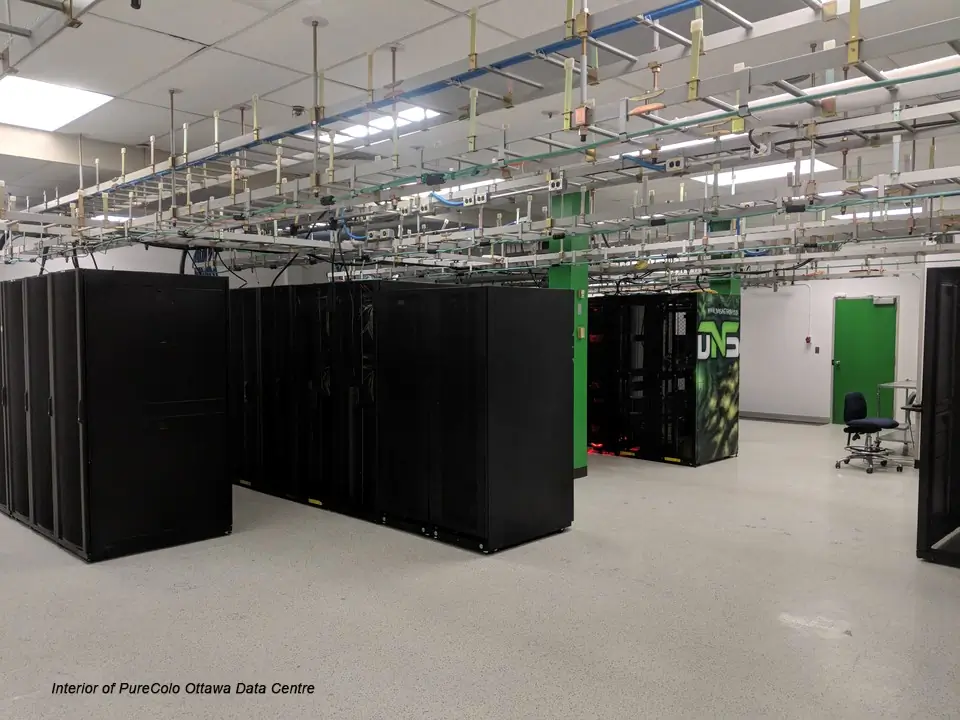
In my day to day, I come across a variety of people who still think a cloud is something that resides in the sky. However, the reality is that very soon there may be more “clouds” on the ground than there are in the sky. In fact, data centre construction was up a whopping 43% in North America from 2016 to 2017, fueled by an increased demand for shared data centres because the total cost of ownership is lower than building, adding to, powering, certifying and keeping compliant your own traditional on-premises servers.
Colocation offers both obvious and hidden benefits for Canadian businesses. While investing in your own data centre requires ongoing security investments and network monitoring, as well as sophisticated back-up systems and redundant controls that maximize network uptime while delivering symmetrical speeds on fibre networks, subscription-based fees for colocation services are predictable and can drive substantial cost savings both in the short term avoidance of capital expenditure and the lost term risk of hardware failure and maintenance. Outsourcing these services can also free up IT staff to drive innovation within business operations instead of merely tending to day-to-day data centre-related functions.
With an annual growth rate of 15.4%, the global colocation market is expected to reach $54.8 billion USD by 2020. This means organizations will have more choice than ever in selecting a colocation provider – and more to wade through to find the best fit for their business. Much like the consolidations of the Government of Canada, many businesses will look to consolidate their infrastructure into centralized facilities that meet their needs versus the pains of running their own.
Here are four things to look for as you consider colocation providers:
- Data sovereignty: For Canadian organizations (and those who deal with The Canadian Government), there’s a compelling reason to look for a colocation provider that’s close to home: U.S. data laws. The U.S. Patriot Act, which was introduced as an anti-terrorism measure, permits American law enforcement officials to access personal and sensitive information without consent if it is stored physically or electronically in the U.S. Meanwhile, in Canada, several laws including the Personal Information Protection and Electronic Documents Act (PIPEDA)and Ontario Business Records Protection Act are among the data privacy protections in place. By letting your data be stored or cross into borders, it becomes at risk and in some cases, violates restrictions put in place by federal or provincial governing bodies.
- Security: While physical security cannot protect you against virtual threats like DDOS attacks, it can absolutely ensure that your large hardware investment is protected, and nothing is physically accessed without your permission. Physically, data centres should offer state-of-the-art tools that ensure only authorized individuals can access the premises. These can include biometric authentication, such as fingerprint scanners, as well as video monitoring of all perimeter, cabinets, cages and suites. Furthermore, if your industry has its own compliance standards for data protection, it’s important to ensure you know what parts of those checklists are the responsibilities of your organization and as well, the responsibilities of the third party data centre you place your trust in.
- Scalability: Consider how innovations in technology and your business operations may change, both during the lifespan of your initial contract and beyond. It’s important to know whether a provider has the space, power and other resources to grow with you, how quickly changes can be implemented, and to understand how any changes are accounted for within your contract as well as the costs associated with changing your services. It is important to physically tour the facility to understand how full it is, and where your growth can actually go. Deep dives will reveal that while there may be physical space for growth, some facilities have restrictions on the amount of power their building can consume, ultimately starving your business’s growth further down the line.
- Carrier Neutrality: One often neglected part of the puzzle when looking at colocation is wether or not the facility you chose is owned by a carrier or not. Carrier neutrality is vital to allowing your business the flexibility to grow and meet the needs of clients both domestically and internationally. Many data centres in Canada are owned by large carriers which from a brand perspective may seem appealing, however can be quite restrictive when addressing the needs of your business. As an article in Digital Realty aptly describes, in “a non-carrier-neutral environment, a customer only has one option for service, and few options for connectivity and colocation. Consumers in a data centre tied to one specific carrier can easily fall victim to high prices, limited bandwidth, and lack of competition, as in that case, they’re at the mercy of whatever provider the data centre is tied to.”
Switching to colocation can offer some important benefits to your businesses – but only if you choose a provider that meets all your needs. Keeping the above considerations in mind as you evaluate the options can help you to identify the best fit in a colocation provider.
Written by Michael Lalonde, Senior Solutions Manager at Purecolo Inc. A Kanata North supplier of carrier-neutral data centers.
Published on LinkedIn May 02, 2018
